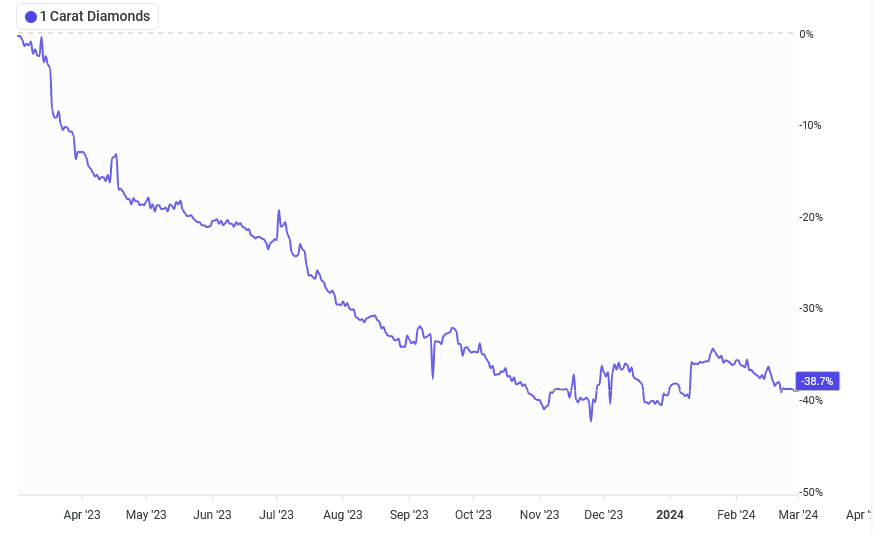In January, the BBC aired an episode of its long running show Dragon’s Den, featuring lab grown diamond startup Kimai. This wasn’t first diamond or jewellery business featured on the hit TV show, as in 2008, I wrote about Clive Billings from diamondgeezer.com turning down a 255,000 pound offer in 2008. However, whilst there was nothing spectacular or out of the ordinary about this episode featuring the founders of Kimai, it certainly did ruffle some feathers in the diamond industry.
Stepping Into the Den
Like a lot of others popping up nowadays, Kimai is a lab grown only diamond jewellery brand, selling engagement rings, wedding rings and other “fine” jewellery. Founders Sidney Neuhaus and Jessica Warch established the brand in 2018 and their claim to fame was that Meghan Markle wore a pair of their earrings in 2019.
Despite the company loosing 100,000 pounds last year, the dragons seemed enamoured with the pair with Steven Bartlett eventually investing 250,000 pounds in exchange for three percent of the business, thus valuing it at around 8.3 million pounds.
Controversy Ensues
Unsurprisingly, the Natural Diamond Council (NDC) wasn’t too happy with the episode and penned an open letter to the BBC in response to “misleading terminology” and “outdated misconceptions about natural diamonds”.
Amongst the complaints highlighted by the NDC were statements such as these that aired during the episode:
- “Bling without the ethical or environmental baggage is the offering…” – BBC voiceover
- “The diamond industry has known many controversies over the years, from unethical mining environment to huge negative environmental impacts” – Kimai
- “…I’ve never been quite sure about the deep ethics of the [diamond] business. I don’t want to be promoting something and I then find out later it’s a blood diamond” – Deborah Meaden
The letter from the NDC then goes on to highlight the benefits that diamond mining brings to countries such as Botswana. It also calls out Kimai on the nomenclature used during the show, as the founders omitted the words “lab grown” during their presentation.
As I wrote in a previous blog, the ethical and environmental claims made by the majority of lab grown only diamond sellers are dubious at best. Therefore, the NDC has every right to complain the broadcaster, in this case, the BBC that they aired false claims. In fact, most lab grown diamond retailers can not account for the entirety of their supply chain, so it is entirely likely that their supply chains aren’t entirely “ethical”.
Silly, Silly Dragons
So apart from being hoodwinked by the environmental and ethical claims of lab grown diamonds, the dragons, especially Steven Bartlett who made the investment really didn’t do their homework.
The fact of the matter is that the market for lab grown diamonds is being flooded at the moment, to the point where prices are collapsing. According to StoneAlgo, the price of 1ct lab grown diamonds have gone down by nearly 40% in the past year.

Above: 1ct lab grown prices from March 2023 to March 2024. Source.
This of course doesn’t bode well for retailers like Kimai who sell lab grown diamonds only. With your sole product going down in price by 40% per year, it will be difficult to justify your business having an 8.3 million pound valuation. When lab grown diamonds reach the price point where fashion jewellery brands such as Pandora or Swarovski start using them for a majority of their stone set products, the lab grown diamond industry will have to pivot from marketing themselves as “fine jewellery” to one that sells mass produced fashion jewellery.
Whilst lab grown diamonds remain the “flavour of the month”, it is important for “dragons”, business owners and consumers to realise that the current trajectory of the lab grown market points toward lab grown diamonds losing most of their value in two to three years. Whilst there have been predictions of a price floor in the past, it is reasonable to predict that lab grown diamonds will reach a price point where they will be ideal for fashion and costume jewellery. Whilst I think lab grown diamonds will continue to be used for engagement rings, by chain stores and independent jewellers alike, when they reach a retail price point of around $200 per carat, businesses such as Kamai may no longer be viable as sellers of fine jewellery. Luckily for the dragons, the bright lights and sleek presentation shown on TV isn’t the be all and end all – in fact, half of Dragon’s Den deals fall through.